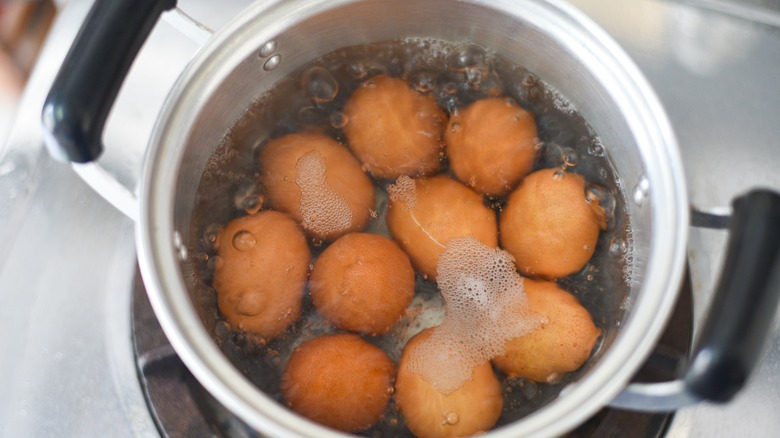Jacques Pépin Sears His Hard-Boiled Eggs And So Should You
As one of the most versatile and important proteins on the planet, eggs take on numerous diverse and delicious forms, from scrambled to poached to fried. Boiling eggs is one of the easiest and most practical methods for cooking, storing, and eating. While a hard-boiled egg needs little more than a sprinkle of salt to become a rich and tasty breakfast or snack, searing them is the taste and texture upgrade you never knew you needed.
Famed French chef, author, teacher, and cooking show pioneer Jacques Pepin shared a recipe for seared hard-boiled eggs in his 2011 cookbook, "The Essential Pepin," as well as a live demonstration from the PBS kitchen in 2020. Pepin calls the dish "Oeufs Jeanette," or "eggs Jeanette," after his mother, whom he credits with introducing the dish to him growing up. Searing is a simple cooking method that involves cooking food in a saucepan with oil over super-high heat. The hot oil helps cook food rapidly while the hot pan creates a crispy browned or charred exterior.
When hard-boiled eggs are seared, you get a crispy, charred edge and a creamy, luscious yolk with toasted and rich flavor notes. Pepin's recipe adds seasonings, milk, and aromatics to the yolk before searing the stuffed halves, but you can also sear halved or whole hard-boiled eggs without any extra embellishment.
Tips and flavor pairings
To successfully execute seared hard-boiled eggs, you'll need the whites and yolks to be set and sturdy. Therefore, soft or medium-boiled eggs cannot withstand searing. Hard-boiled eggs need at least nine minutes to reach peak firmness. You can then throw the eggs in an ice bath to stop the cooking and facilitate the setting and peeling process. For Ouefs Jeanette, Pepin makes a creamy yolk filling by mixing the yolks with milk, garlic, parsley, salt, and pepper before stuffing the mixture back into the whites and searing.
Because you'll be heating the oil at a high temperature, it's best to use a neutral oil with a high smoke point, like avocado oil or safflower oil. Adding seasonings and milk will enhance the depth of flavor of otherwise neutral eggs while also increasing the volume of the yolks for a more robust and complex profile. You can build upon Pepin's recipe by adding your favorite seasonings and mix-ins. For example, you could add a bit of mayonnaise, paprika, hot sauce, and relish for a seared version of deviled eggs.
You can drizzle a tangy and sweet dijon vinaigrette over the eggs and serve them as hors d'oeuvres. They'd also taste delicious served in a harissa-infused, fire-roasted, crushed tomato bath sprinkled with cilantro and feta and served with fresh pita. Alternatively, you could use them to top fancy breakfast toasts or salads — they would certainly upgrade your tuna niçoise or cobb salad.

